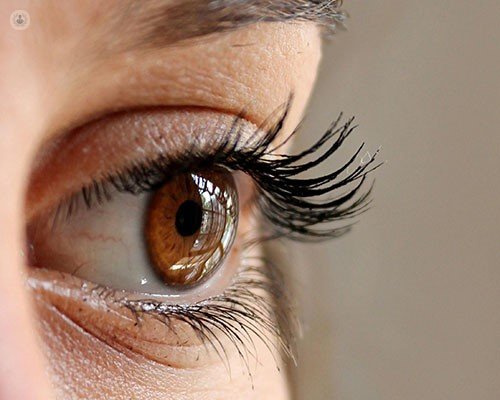Myopia: A comprehensive guide
Written in association with:In his latest online article, Mr Aris Konstantopoulos gives us his insights into myopia, commonly referred to as short-sightedness. This condition, characterised by blurred distance vision, has garnered attention due to its increasing prevalence, particularly in regions like South East Asia, Europe, and North America. Understanding its causes, symptoms, and treatment options is crucial for effective management.

What is myopia?
Myopia occurs when the eyeball is longer than the optical requirements for clear vision. This elongation causes light rays to focus in front of the retina rather than directly on it, resulting in blurry vision for distant objects. This condition often manifests during childhood or adolescence and can significantly impair vision even at low levels of severity.
Symptoms of myopia
Recognising the symptoms of myopia is crucial for early diagnosis and intervention. Common indicators include:
- Blurred distance vision while maintaining clear near and intermediate vision.
- Headaches, especially after prolonged visual tasks, often alleviated by squinting.
- Increased difficulty with night vision, a common occurrence due to the eye's natural tendency to become more short-sighted in low-light conditions.
Causes and risk factors
Although the exact cause of myopia remains elusive, several factors contribute to its development:
- Genetics: Family history plays a significant role, with a strong predisposition observed in individuals with affected relatives, as evidenced by studies involving twins.
- Environmental factors: Higher education levels, increased near work activities like reading and computer use, and decreased outdoor exposure are associated with higher myopia rates. Prolonged near work may stimulate elongation of the eyeball over time.
Diagnosis
Optometrists or eye doctors diagnose myopia through comprehensive eye examinations, including refraction tests to assess the eye's refractive status. These exams also help identify other ocular abnormalities such as keratoconus or cataracts.
Treatment options
Several treatment modalities are available to manage myopia, tailored to individual needs and preferences:
- Spectacles: Traditional and widely used, spectacles correct myopia efficiently. However, they may distort peripheral vision and pose inconveniences in certain situations.
- Contact lenses: Offering greater convenience and visual acuity, contact lenses are a popular choice for myopia correction. However, they may lead to complications like dry eyes and infections with prolonged use.
- Laser eye surgery: Procedures like LASIK, ReLEx SMILE, and LASEK reshape the cornea, correcting refractive errors permanently. Laser eye surgery is safe and effective, with a high success rate and minimal risks.
- Implantable collamer lens (ICL): Ideal for higher prescriptions or irregular corneas, ICLs are implanted inside the eye, providing clear vision without external aids. They offer a safe alternative to laser surgery.
- Refractive lens exchange (RLE): Suitable for individuals over 55 or those with high prescriptions, RLE replaces the eye's natural lens with an artificial one, similar to cataract surgery.
Safety of laser eye surgery
Laser eye surgery, a widely performed elective procedure globally, boasts an excellent safety profile. With over 100,000 procedures annually in the UK alone, laser vision correction is considered safer than long-term contact lens wear. Complications are rare, and the vast majority of patients achieve significant visual improvement post-surgery.
Mr Aris Konstantopoulos is an esteemed ophthalmologist. You can schedule an appointment with Mr Konstantopoulos on his Top Doctors profile.


